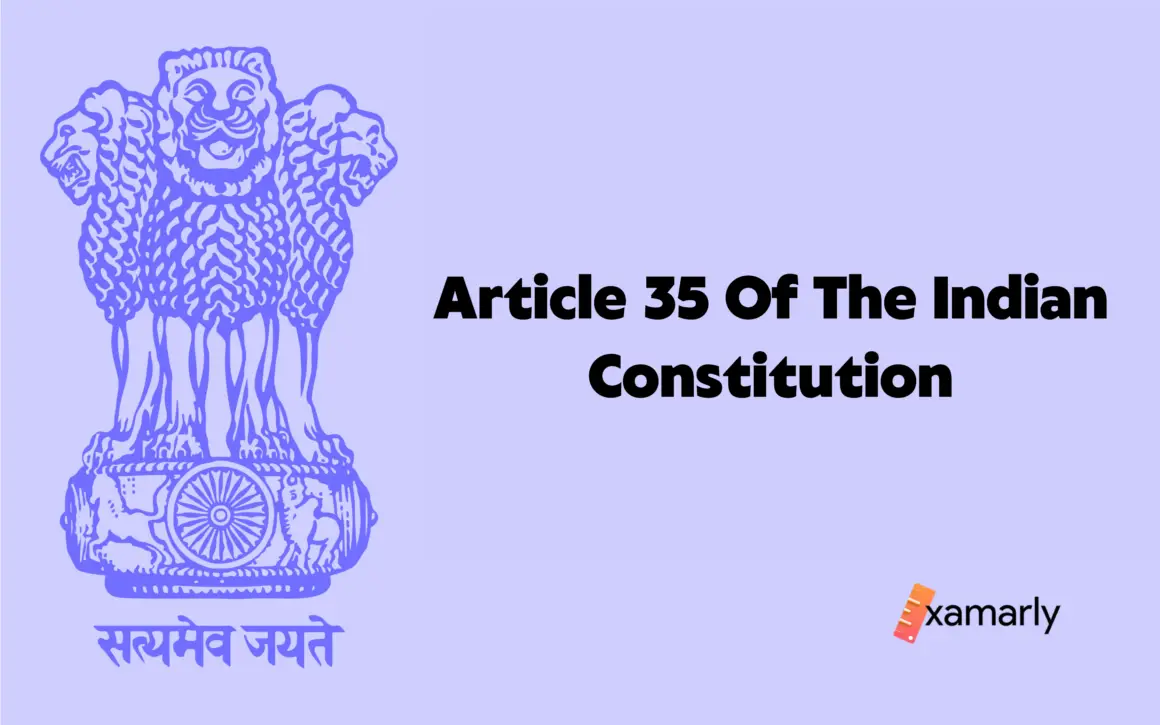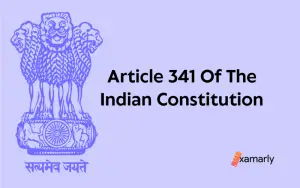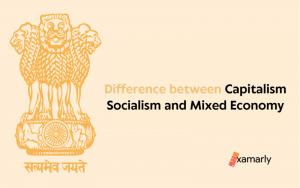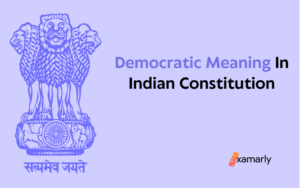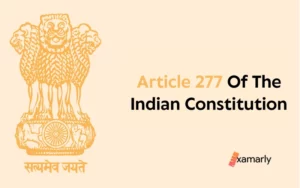Article 35 Of The Indian Constitution was included in Article 27 of the Draft Constitution. It was debated over on December 9, 1948. The original documentation of this legislation consisted of the verdict that only parliament could make laws related to fundamental rights. However, the Drafting Committee Chairman suggested that the fundamental rights alterable by the parliament should be Article 16(3), Article 32(3), Article 33 and Article 34.
A member opined that this motion would dilute the legislative powers of the parliament. This argument was taken into consideration by the Drafting Committee Chairman who amended the draft as the parliament had provisions related to “penal authority” only in “specific occasions”. The specific occasions were limited to the above mentioned articles only.
Article 35 A was not part of Article 35 when the Constitution was formulated; it was added to the Constitution in 1954 by a presidential order.
First Hand Knowledge
Article 35 of the Indian constitution defined itself as well as its application in various other articles; read excerpt from the Constitution to have better understanding.
Notwithstanding anything in this Constitution,—
(a) Parliament shall have, and the Legislature of a State shall not have, power to make laws—
(i) with respect to any of the matters which under clause (3) of article 16, clause (3) of article 32, article 33 and article 34 may be provided for by law made by Parliament; and
(ii) for prescribing punishment for those acts which are declared to be offences under this Part;
(b) any law in force immediately before the commencement of this Constitution in the territory of India with respect to any of the matters referred to in sub-clause (i) of clause (a) or providing for punishment for any act referred to in sub-clause (ii) of that clause shall, subject to the terms thereof and to any adaptations and modifications that may be made therein under article 372, continue in force until altered or repealed or amended by Parliament.
Related – Legislation to give effect to the provisions of this Part.
Article 35 of The Indian Constitution – In Simpler Terms
- Article 35 bestows on the Parliament an exclusive power. That right is related to constitutional amendments, that is, alteration or new provisions being added or deleted to Articles 16 (3), 32 (3), 33 and 34. Only the Parliament can modify provisions relating to the above mentioned articles.
- Article 16(3) endows the parliament with the power to prescribe employment to any public office with respect to the candidate’s residence. Argument for the validity of this article points out the rightful allocation of resources. Argument against the righteousness of the article discusses the article’s indirect involvement to creating barrier to class mobility and aiding compartmentalization of the diverse cultures of India. In Jammu and Kashmir, Government jobs are reserved for “domiciles”.
- Article 32(3) is about constitutional remedy. One can go to the court of law enforcement
- Also, this Article gives constitutional provision to the Parliament to decree upon offence punishable by violation of the fundamental rights part.
- Thus, this article becomes crucial to the safeguarding and implementation of the Fundamental Rights and the basic freedom to citizens. This Article forms Part 3 of the constitution that deal with the fundamental rights.
- The Fundamental Rights are to be given to every citizen without discrimination on grounds of religion, caste, colour, sex, creed, social status, economic status, etc. Our Constitution is inspired by many foreign countries’ constitutions. Fundamental rights is a successor of the US Constitution’s Bill of Rights and are mentioned in the Constitutional articles 12-35.
- The Fundamental rights are mentioned as follows: Right to Equality, Right to Freedom, Right against Exploitation, Right to Freedom of Religion, Cultural and Educational Rights, and Right to Constitutional Remedies. Right to property was a fundamental right earlier, but keeping in mind the ideas of redistribution of wealth except immovable property as should be in an ideal socialist state, this right was removed from fundamental right. Thus the fundamental rights under Articles 12-35 uphold the human rights including personal liberty, freedom of conscience, freedom of speech, freedom of expression, freedom to follow any religious instruction, and equality of opportunity in public employment and appointment matters. There is a strict prohibition of discrimination on the basis of race, caste, sex, social status, religion and place of birth. and everyone should get equal employment opportunity in matters of employment under the state. Prohibition of Employment of children below the age of 14 and prohibition of traffic are also strictly enforced. The most important term here is ‘equality before law’, which evokes the spirit of oneness among Indian citizens.
You Might Also Like – Article 30 Of The Indian Constitution
Don’t Be Wary Of The Technical Terms, Be Aware Of The Constitution:
The State Legislature has no power in controlling the laws mentioned below whereas The Parliament exclusively holds total, uncontested legislative powers to modify laws with respect to
- Prescribing resident status as a prerequisite for certain employments or appointments in a union territory or local authority or other authority
- Empowerment of courts except Supreme Court and high courts to issue directions, orders and writs of all kinds
- Restriction or abrogation of the application of fundamental rights to members of armed forces, police forces, etc
- Indemnifying any government employee or any other person for any act done during the operation of martial law in any area
- Punishment for acts involving untouchability, that is discrimination against certain classes of persons
- Traffic in human beings and forced labour.
Why Is Article 35A Of The Indian Constitution Regarded Controversial?
Article 35A has surfaced again and again and is politically very significant in the current geopolitical scenario. Article 35A equips the government of Jammu and Kashmir the special status to define permanent residents and give them special rights and privileges with regard to employment, acquisition of property which is immovable property, admission to professional educational institutions and other forms of aid in the state. Article 35A came into being because Jammu and Kashmir was a princely state and the hereditary state subject were not colonial subjects directly under British rule. The Maharaja of Jammu and Kashmir enacted laws between 1912-1932 that would special provisions to Kashmiris in acquisition of estates and acquisition of lands and its usage, and right to a government office.
Now, the argument for the inclusion of Article 35A on the basis of India being a diverse country with a wide spectrum of cultures falls weak when contrasted with the DPSP of Uniform Civil Code. The right wing political practitioners are arguing against the validity of Article 35 A upon the claim that one particular state cannot give its “permanent residents” resident certificate that will determine the fate of those people in acquiring immovable property. In such a case the legislative power of the parliament is diluted. Right to equality which is a fundamental right (article 14) is also contradicted through the special rights under Article 35A.
Opponents of Article 35 A pointed out the fact that the presidential order by the then president Rajendra Prasad was not done according to the constitutional procedure mentioned in article 368; thus the legality of the article has always remained a sensitive subject. The Indian Government has also argued that the Right to property has been dismissed from the list of Fundamental rights, so preoccupation of Article 35 in matters of delineating property to the permanent residents of J&K stands contradictory.
What Is The Status Of Article 35A?
Article 35 A is repealed on August 5, 2019 upon the grounds discussed above. Article 35 A and Article 370 were repealed together as remedies for enforcement of One nation one rule policy. Now the Indian constitution is totally enforced in the state of J&K. Article 370 had been described as a “temporary provision”, so the annulment was not unconstitutional in the eyes of the judiciary.
Summing Up
Article 35 of the Indian constitution forms the last among the articles that discuss fundamental rights (articles 12-35). This article discusses the limited provision that stunts the legislative power of the parliament. In other words, it can be said Article 35 is purposefully controlling the legislative powers of the parliament to keep the basic structure of the constitution intact. We come to a close of part III of the Constitution with Article 35. One of its clauses put a seal upon the justiciability of the Fundamental Rights by delineating the fact that claiming Fundamental Rights before the court of law is also a Fundamental right in itself.


